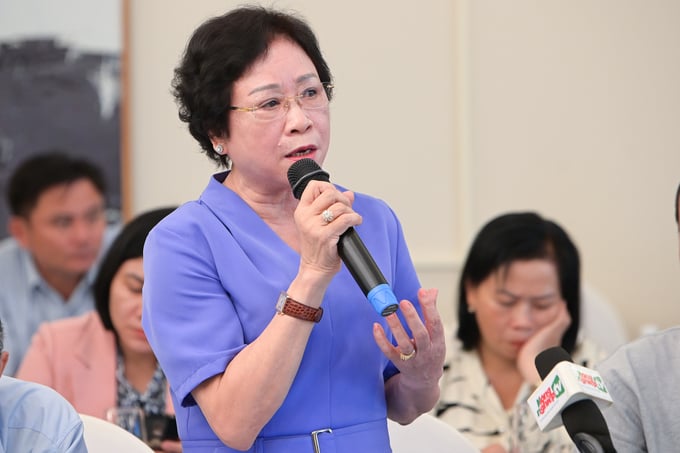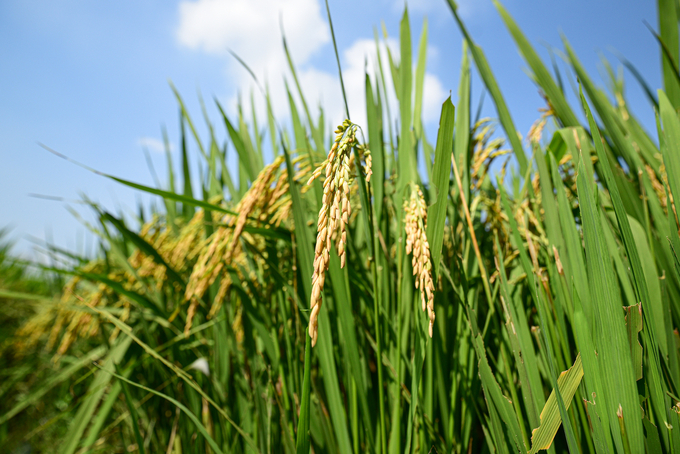November 25, 2025 | 03:13 GMT +7
November 25, 2025 | 03:13 GMT +7
Hotline: 0913.378.918
November 25, 2025 | 03:13 GMT +7
Hotline: 0913.378.918

Ms. Tran Kim Lien, Chairman of the Vietnam Seed Group Joint Stock Company Board of Directors, shared at the seminar. Photo: Tung Dinh.
During the talkshow on "Public-private connection and cooperation in rice variety selection research and trade," Ms. Tran Kim Lien, Chairwoman and CEO of Vietnam National Seed Group Joint Stock Company (Vinaseed Group), discussed the obstacles in the cooperation mechanism. The Vietnam Seed Trade Association and Vietnam Agriculture News organized the event jointly.
Initially, she asserted that firms serve as facilitators, connecting state-owned research facilities to the wider market. She emphasized that implementing suitable rice varieties requires the involvement of enterprises.
Ms. Lien reports that Vinaseed has made investments in multiple research projects focused on seed selection for trading purposes. The current collaboration between businesses and research institutes relies on the implementation of Decree No.70, which outlines the administration and utilization of assets acquired via the execution of scientific and technological tasks funded by the government. Enterprises do not have proprietary rights on rice varieties, even though they contribute to the research process.
Ms. Tran Kim Lien specifically stated that both firms and research institutes willingly participate in public-private partnerships, but they face a lack of specific legal framework. Since 2018, institutes have been unable to transfer the copyrights of plant varieties to enterprises, even when the enterprises are involved in the research process. Instead, the transfer process is limited to the rights of business production.
"Ms. Lien expressed concern about the lack of a legal framework for this process, which poses risks. Additionally, the contract may be subject to cancellation if tax and audit units exercise surveillance.

VNR20 rice of Vinaseed in Bac Ninh. Photo: Tung Dinh.
Alternatively, the collaboration in public-private partnerships may also face scrutiny about pricing criteria. Ms. Lien stated that when firms lack monopolistic rights over varieties, it becomes challenging to distribute scientific discoveries owing to the decrease in rights and responsibilities.
During the debate, the Chairman of the Board of Directors of Vinaseed highlighted a concern regarding the "buy-out" contracts for crop varieties prior to 2018. These contracts are currently encountering challenges in obtaining license extensions, posing a potential danger of losing the types.
Ms. Tran Kim Lien emphasizes the pressing need for management agencies to establish policies, directives, and guidelines for research institutes regarding the handling of crop varieties sold prior to the enforcement of Decree No. 70.
Furthermore, it is imperative for management agencies to expeditiously release a comprehensive roster of determinations about the allocation of crop variety rights to respective entities. This list provides firms with the necessary guidelines to engage in the process of collaboration and technology transfer.
"Management agencies should disseminate information about the technology transfer process to enable enterprises to engage in the commercialization of research accomplishments related to rice varieties," emphasized Ms. Tran Kim Lien.
Ms. Lien proposed the implementation of more precise standards in order to promptly engage firms such as Vinaseed in the crop variety research process, thus enhancing public-private collaboration and resource mobilization.
Translated by Linh Linh

(VAN) ILDEX Vietnam 2026 will connect more than 250 exhibitors and 10,000 visitors from 40 countries.

(VAN) Hue City is accelerating efforts to combat IUU fishing, aiming to remove EC’s 'yellow card' and promote sustainable fisheries development.

(VAN) The recent torrential downpours and unprecedented flooding in the Southern Central Coast are a highly unusual meteorological and hydrological event.

(VAN) The Southern Central Coast and Central Highlands regions have suffered massive agricultural losses, with over 80,000 hectares of rice and crops, alongside millions of livestock, being swept away, causing severe damage to farmer livelihoods.

(VAN) Trieu Son commune deploys a 'virtual assistant' to help residents complete administrative procedures.

(VAN) Applying green technology in rural water supply and sanitation helps improve resource efficiency, protect the environment, and enhance community living standards.

(VAN) Developing biosecure livestock production is the key that helps Tuyen Quang form linked chains in livestock production and build its brand in the market.